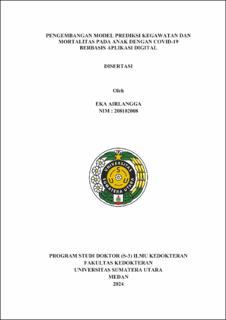Pengembangan Model Prediksi Kegawatan dan Mortalitas pada Anak dengan Covid-19 Berbasis Aplikasi Digital
Development of Severity and Mortality Prediction Models of Children with Covid-19 and Its Digital Application

Date
2024Author
Airlangga, Eka
Advisor(s)
Wahyuni, Arlinda Sari
Siregar, Jelita
Pasaribu, Ayodhia Pitaloka
Metadata
Show full item recordAbstract
Background: During the COVID-19 pandemic, the mortality rate of children with COVID-19 in Indonesia is higher than the neighboring countries in Asia or the Southeast Asian region. In the other side, limited health facilitis and its resources are not equal to the need for hospitalization or referral cases particularly when pandemic happens. Limited health facilities such as Puskesmas or type D or tupe C hospitals can act as hubs for early identification of referral cases, early management, or self-isolation of children cases during pandemic happen. Prediction models as severity or mortality models which are not available currently are needed in the earlier examination to reduce children mortality during pandemic. Both models which are available in digital application are part of clinical decision support system which may assist general practitioners, midwifes or nurses of limited health facilities to increase children health and care during similar pandemic happen.
Objective: To determine the severity and mortality models of children during pandemic, based on data of children with COVID-19. The severity and mortality prediction models are made available as mobile Health (mHealth) adroid based-application.
Methods: The retrospective cohort study was done to 303 inpatient and 114 outpatient children confirmed as SARS-CoV-2 infection, located in Medan, Sumatera Utara from 2020 to 2022 as basis of children data during pandemic. Severe or non severe category, patients‘ outcome, demographic characteristics, clinical symptoms and signs, laboratory and radiology results were recorded according to the national and international guidelines. Data were analyzed using SPSS program for univariate, bivariate and multivariate analysis. The statistically significant data are then made as knowledge-based mHealth application and by using expert system certainty factor. The mHealth application created was simulated and tested in 2 hospitals located in Deli Serdang regency.
Results: Severity model consists of age under 1 year, undernutrition including malnutrition, high N/L ratio and CRP values. Existing of comorbid disease, shortness of breath, anemia, thrombocytopenia, indicated as mortality model. Both models show as fit models, equipped with various case‘s scenarios. The android-based mHealth application using expert system certainty factor is available namely as ®EndCOV and freely downloadable by registered general practitioners, midwifes and nurses. The initial ®EndCOV simulations was conducted at Bangun Purba and Pancur Batu hospitals of Deli Serdang district and its got satisfaction results.
Conclutions: Based on data of children with COVID-19, the severity and mortality models are available and in form of mHealth ®EndCOV digital application, to be used for facing similar future pandemic. The andoid-based mHealth ®EndCOV was simulated at 2 hospitals located in Deli Serdang district and show satisfaction results. As part of pandemic preparedness, the availibility of ®EndCOV aimed to assist clinical decision support system of general practitioners of limited health facilities in wider scale.
Collections
- Doctoral Dissertations [194]
